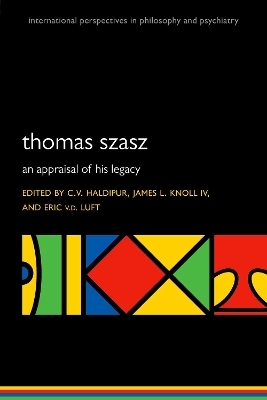
Thomas Szasz
Oxford University Press (Verlag)
978-0-19-881349-1 (ISBN)
His works made him arguably one of the world's most recognized psychiatrists, albeit one of the most controversial. This book critically examines the legacy of a man who challenged the very concept of mental illness.
Thomas Szasz wrote over thirty books and several hundred articles, replete with mordant criticism of psychiatry, in both scientific and popular periodicals. His works made him arguably one of the world's most recognized psychiatrists, albeit one of the most controversial.
These writings have been translated into several languages and have earned him a worldwide following. Szasz was a man of towering intellect, sweeping historical knowledge, and deep-rooted, mostly libertarian, philosophical beliefs. He wrote with a lucid and acerbic wit, but usually in a way that is accessible to general readers. His books cautioned against the indiscriminate power of psychiatry in courts and in society, and against the apparent rush to medicalize all human folly. They have spawned an eponymous ideology that has influenced, to various degrees, laws relating to mental health in several countries and states.
This book critically examines the legacy of Thomas Szasz - a man who challenged the very concept of mental illness and questioned several practices of psychiatrists. The book surveys his many contributions including those in psychoanalysis, which are very often overlooked by his critics. While admiring his seminal contribution to the debate, the book will also point to some of his assertions that merit closer scrutiny. Contributors to the book are drawn from various disciplines, including Psychiatry, Philosophy and Law; and are from various countries including the United States, Canada, New Zealand, United Kingdom and the Netherlands. Some contributors knew Thomas Szasz personally and spent many hours with him discussing issues he raised in his books and articles.
The book will be fascinating reading for anyone interested in matters of mental health, human rights, and ethics.
C.V. Haldipur is Emeritus Professor in the Department of Psychiatry, SUNY Upstate Medical University. He met Thomas Szasz, then already at Upstate, when he was a trainee in England in the 1960s, maintained correspondence with Szasz, and eventually joined the same faculty after completing his psychiatric training in Cambridge and Edinburgh. Haldipur has held various academic and administrative positions at Upstate, including Director of Medical Student Education in the Department of Psychiatry and Co-Director of the required Practice of Medicine (POM) course for all first and second-year medical students. He is a Member of the Royal College of Psychiatrists and a Distinguished Fellow of the American Psychiatric Association. James L. Knoll IV, is Director of Forensic Psychiatry and Professor of Psychiatry at SUNY Upstate Medical University. He has worked as a forensic evaluator for state and federal courts, corrections, and the private sector. He is Editor-in-Chief Emeritus of Psychiatric Times and a contributing editor for the Correctional Mental Health Report. He has authored over 150 publications in journals and book chapters. His afterword to David Kaczynski's memoir, Every Last Tie: The Story of the Unabomber and His Family, was published by Duke University Press in 2016. He has authored chapters in two well-received books from Oxford University Press: Stalking: Psychiatric Perspectives and Practical Approaches, edited by Debra A. Pinals (2007), and the Oxford Textbook of Correctional Psychiatry, edited by Robert L. Trestman et al. (2015). Knoll developed an academic friendship with Szasz in Upstate's Department of Psychiatry. Eric v.d. Luft earned his B.A. magna cum laude in philosophy and religion at Bowdoin College in 1974, his Ph.D. in philosophy at Bryn Mawr College in 1985, and his M.L.S. at Syracuse University in 1993. From 1987 to 2006 he was Curator of Historical Collections at SUNY Upstate Medical University. He has taught at Villanova University, Syracuse University, Upstate, and the College of Saint Rose. He is the author, editor, or translator of over 640 publications in philosophy, religion, librarianship, history, history of medicine, and nineteenth-century studies, including Hegel, Hinrichs, and Schleiermacher on Feeling and Reason in Religion: The Texts of Their 1821-22 Debate (1987), God, Evil, and Ethics: A Primer in the Philosophy of Religion (2004), A Socialist Manifesto (2007), Die at the Right Time: A Subjective Cultural History of the American Sixties (2009), Ruminations: Selected Philosophical, Historical, and Ideological Papers (vol. 1, 2010; vol. 2, 2013), and The Value of Suicide (2012).
About the Editors
About the Contributors
C.V. Haldipur, James L. Knoll IV, and Eric v.d. Luft: Introduction
Part I. Intellectual Roots of Szasz's Thought
1: Stephen Wilson: Study on the Szaszophone: Theme and Variations
2: Jan Pols: Leading Up to The Myth of Mental Illness
3: Eric v.d. Luft: Philosophical Influences on Thomas Szasz
4: John Z. Sadler: Conceptual Models of Normative Content in Mental Disorders
Part II. The Concept of Mental Illness
5: George J. Annas: Szasz, Suicide, and Medical Ethics
6: Robert W. Daly: Agency, Mental Illness, and Psychiatry: A Response to Thomas Szasz
7: K.W.M. Fulford: Taking Szasz Seriously and his Critics Too: Thesis, Antithesis, and a Values-Based Synthesis
8: E. Fuller Torrey: Schizophrenia: Sacred Symbol or Achilles Heel
9: James L. Knoll IV: Suicide Prohibition: Shame, Blame, or Social Aim?
10: Jennifer Church: Myths, Projections, and Overextensions: The Conceptual Landscape of Thomas Szasz
11: Mantosh J. Dewan and Eugene A. Kaplan: The Clinical Wisdom of Thomas Szasz
12: Ronald W. Pies: Thomas Szasz and the Language of Mental Illness
Part III. Szasz's Larger Impact
13: Allen Frances: The Myth and Reality of Mental Illness
14: Nancy Nyquist Potter: Reform and Revolution in the Context of Critical Psychiatry and Service-User / Survivor Movements
15: Neil Pickering: Thomas Szasz and the Insanity Defense
16: Marisola Xhelili Ciaccio: Bringing Psychopaths into the Moral Community: Reassessing Agency Cultivation and Social Participation
17: Mona Gupta: Mental Illness is Not a Myth: Epistemic Favoritism in Research Funding
18: Jennifer Radden: Rights, Responsibilities, and Mental Illnesses: A Chronology of the Szasz Decades
19: Thomas Schramme: Szasz's Legacy and Current Challenges in Psychiatry
C.V. Haldipur: Epilogue
Index
| Erscheinungsdatum | 12.02.2019 |
|---|---|
| Reihe/Serie | International Perspectives in Philosophy and Psychiatry |
| Verlagsort | Oxford |
| Sprache | englisch |
| Maße | 163 x 234 mm |
| Gewicht | 482 g |
| Themenwelt | Literatur ► Biografien / Erfahrungsberichte |
| Geisteswissenschaften ► Philosophie | |
| Geisteswissenschaften ► Psychologie ► Persönlichkeitsstörungen | |
| Medizin / Pharmazie ► Medizinische Fachgebiete ► Psychiatrie / Psychotherapie | |
| ISBN-10 | 0-19-881349-X / 019881349X |
| ISBN-13 | 978-0-19-881349-1 / 9780198813491 |
| Zustand | Neuware |
| Haben Sie eine Frage zum Produkt? |
aus dem Bereich


